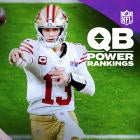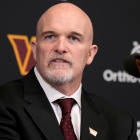
If there is one NFL team that best defines the strangeness that has been 2020, it is the Houston Texans. Starting with their blown 24-0 lead against the Chiefs in the playoffs, this has been a bizarre year for the Texans, who traded away one of the NFL's best players while acquiring two other players with significant injury concerns.
While coach Bill O'Brien's decision to trade away DeAndre Hopkins received understandable criticism, the Texans did manage to make some decent roster decisions this offseason. Houston was able to come to terms on a long-term deal with tackle Laremy Tunsil. During the draft, Houston added three potentially significant pieces to its defense, players who are expected to make an immediate impact in 2020. With their last pick, the Texans added to their receiving corps by selecting former Rhode Island wideout Isaiah Coulter.
With the NFL's opening weekend just around the corner, we decided to make three bold predictions for the Texans' 2020 season.
1. Watson, even without Hopkins, will continue to perform at a Pro Bowl level
While Watson's talent is undeniable, the success of Houston's offense is largely predicated on its running game, which finished ninth in the NFL in yards gained last season. This offseason, the Texans replaced Carlos Hyde -- a 1,000-yard rusher a season ago -- with David Johnson, a former All-Pro who was used sparingly during his final year with the Cardinals. Johnson, a superb receiver out of the backfield, will be complemented in Arizona's backfield with Duke Johnson, who averaged nearly five yards per carry during his first season in Houston. Texans' fans should should expect a heavy diet of Johnson and Johnson in 2020, which should help open things up for Watson in the passing game.
Speaking of the passing game, the Texans signed veteran wideout Randall Cobb to a three-year deal shortly after the team traded away Hopkins. A Pro Bowler in 2014, Cobb, a 10-year veteran who will turn 30 before the start of the 2020 season, spent his first eight seasons with the Packers before signing with the Cowboys last offseason. Cobb enjoyed a solid season in Dallas, catching 55 passes for 823 yards and three touchdowns while averaging a career-best 15.1 yards per reception.
The Texans also signed Brandin Cooks, who, like David Johnson, is facing questions about his health heading into his first season in Houston. A 1,000-yard receiver each season from 2015-18, Cooks, who sustained five known concussions during the first six years of his career, suffered two concussions in a 25-day span during the 2019 season. But if he is healthy, Cooks (who is still just 26 years old) will undoubtedly be a valuable part of the Texans' offense in 2020, and possibly beyond.
Houston also added reinforcements on its offensive line. They spent a fourth-round pick on former North Carolina offensive tackle Charlie Heck, who is expected to compete to be Houston's starting right guard. The team also signed undrafted rookies Cordel Iwuagwu and Elex Woodworth, who are both expected to, at the least, add depth at the Texans' guard positions in 2020.
Each of these pieces should help Watson continue his ascension as one of the top young quarterbacks in the NFL. It should also help Watson (who had his fifth-year option picked up by the Texans this offseason) in his future contract negotiations.
2. Houston's defense will feature three rookies in its starting lineup
After finishing 19th in the league in scoring defense during the regular season, the Texans' defense could do little to stop Patrick Mahomes and the Chiefs from scoring 51 points in the AFC divisional round. Houston responded by spending its first two draft picks on defense, acquiring former TCU defensive lineman Ross Blacklock with the 40th pick and former Florida EDGE rusher Jonathan Greenard with the 90th pick. The Texans then spent a fourth-round pick on former Penn State cornerback John Reid, who bolstered his draft stock after a solid performance at the NFL combine. All three players could wind up with starting spots on Houston's starting lineup by Week 1.
Let's start with Blacklock, who surprisingly fell to the Texans in the second round during April's draft. While the ongoing pandemic prevented teams from holding OTAs and minicamp, Blacklock impressed the Texans' coaching staff after showing them videos of his strength and conditioning drills prior to the start of training camp. Houston's coaches believe that Blacklock has added weight and strength to his 6-foot-3, 290-pound frame in the months following the draft. Texans' coaches would "love" for Blacklock to earn a starting job as soon as possible, according to John McClain of the Houston Chronicle. If he doesn't earn a starting job by Week 1, Blacklock will likely be summoned to come off the bench on passing situations.
The SEC's best pass rusher last fall, the 6-foot-4, 263-pound Greenard, a graduate student for the Gators, filled the stat sheet in 2019. During his one active season in Gainesville, Greenard racked up 10 sacks and 16 tackles for loss while also forcing three fumbles. Greenard's success last season is more impressive when you consider that he missed essentially the entire 2018 season -- his senior season at Louisville -- after suffering a wrist injury on the season's opening series.
Greenard is expected to compete with Brennan Scarlett for a starting spot on Houston's defense. He is also expected to make an impact on special teams, which may take precedent over his possible responsibilities on defense. How quickly Greenard can learn the Texans' scheme may ultimately determine where he fits in the Texans' defensive plans for Week 1. But given what he has already shown during camp, expect Greenard to make a serious push to be a starter when the Texans kickoff the season against the defending champion Chiefs.
The same can be said of Reid, who ultimately raised his draft stock following his solid performance at the NFL combine. Reid, who raised his draft stock following a solid outing at the NFL combine, reportedly impressed his defensive coaches during Houston's virtual offseason. His speed, maturity (at 24, he's one of the league's oldest rookies) and toughness should help him transition from college to the pro game quicker than most defensive backs.
3. Texans sign Antonio Brown to bolster receiving corps
In a perfect world, Cooks, Cobb, Coulter, Will Fuller, and Kenny Stills will be enough to overcome the loss of Hopkins. But if not, don't be surprised if the Texans place a call to Brown, who recently received an eight-game suspension by the NFL for violating the league's personal conduct policy. While the Seahawks have expressed interest in signing him, Brown remains an unrestricted free agent with about a month remaining before the start of the season.
While he comes with baggage, the 32-year-old Brown finally appears ready to resume his career after essentially sabotaging it over the past 20 months. Over the past several months, Brown has mostly steered clear of controversy while continuing to post videos of his training. And while he's played in only one game since leaving the Steelers, Brown doesn't appear to have lost a step as he enters what would be his 11th season.
In Brown, the Texans would be getting the most productive receiver in league history over a six-year span. From 2013-18, Brown averaged 114 receptions for 1,526 yards and 11 touchdowns per season. But despite that production, Brown's recent off-field issues have obviously left him off an NFL roster, which means that it will likely take a team that is an extreme need at receiver to sign the five-time All-Pro.
While his improv with Ben Roethlisberger is part of what made him dangerous in Pittsburgh, Brown is also an exceptionally gifted route runner, which should allow him develop a quick rapport with any quarterback. That was on display last fall, when Brown caught a touchdown pass during his first -- and only game -- with Tom Brady as his quarterback. And while Watson may not be Brady (who is?), he is an accurate passer who -- with Hopkins on his side -- has shown that he can get the most out of having a top-tier receiver at his disposal.
Brown's ability as a player is not the question. His attitude, both off the field as well as in the facility, remains the primary concern (along with his ongoing civil suit). That being said, one would think that Brown, whose career is on life support, is finally ready to buy completely into what his next team is selling. And while there are certainly risks involved in signing him, what Brown brings to the table as a player is a risk that a team like the Texans -- a team that is desperate to take the next step after several disappointing playoff outings -- should possibly consider taking.






















